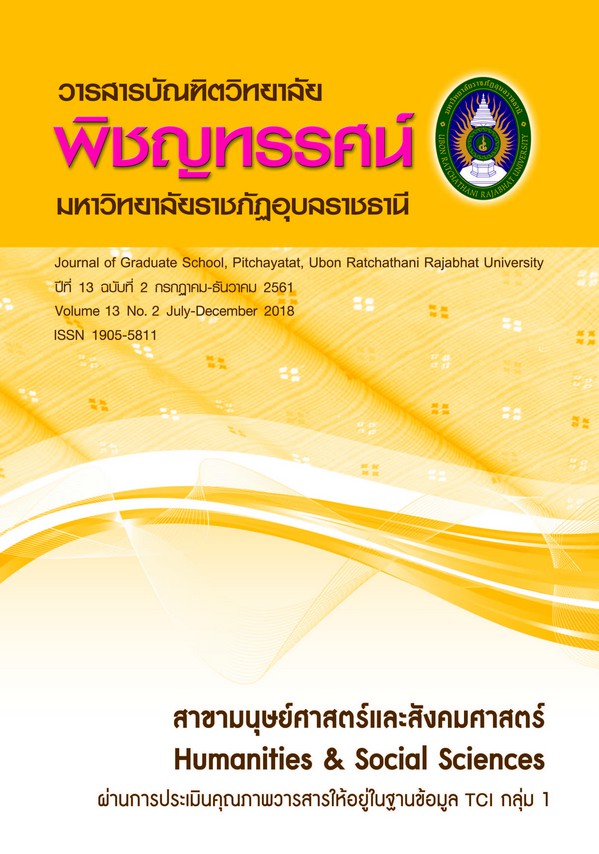The Development Model to Improve ICT Skills for Child Development Center Staff by Implementing Self-Directed Strategies
คำสำคัญ:
Improve ICT Skills, Self-directed strategies, Child development center staffบทคัดย่อ
This research is the development model to improve ICT skills for child development center staff by self-directed strategies. Objectives of the research are as follows: 1. to develop a model for improving ICT skills by implementing self-directed strategies for staff at child development center 2. To study ICT skills improvement by implementing self-directed strategies for staff at child development center comparing pre-test and post-test scores of the samples. The samples are 60 staff in child development center selected by sampling and simple methods, the samples are evaluated basic ICT skills with the scores 30 points and be randomly assigned to experimental and control groups. A random match (Match Pair) grouping samples into two groups of 30 people each experimental group first formed to improve ICT skills with self-directed strategies. The second group was formed to improve the ICT skills without self-directed strategies. The tools used in this research are the learning plan and ICT skill evaluation forms to improve ICT skills with self-directed strategies and without self-directed ICT skills assessment. The statistics used in this research is the mean and standard deviation. Comparative analysis of the differences between the ICT skills after learning of the two groups are independent (t-test independent samples). The research found that the mean and standard deviation of pre-test scores of basic ICT knowledge for an experimental group to improve ICT skills by using usual education (not self-directed strategies) is = 13.35 S.D. = 2.153. The variation of pre-test scores of basic ICT knowledge for an experimental group to improve ICT skills by using usual education (not self-directed strategies) is difference in statistically significant at .05. For the mean and standard deviation of pre-test scores of basic ICT knowledge for a control group to improve ICT skills by implementing self-directed strategies is
= 14.188 S.D. = 1.549. The variation of pre-test scores of basic ICT knowledge for a control group to improve ICT skills by implementing self-directed strategies is difference in statistically significant at .05. For the variation of basic ICT knowledge pre-test scores for an experimental group by using usual education (not self-directed strategies) comparing with a control group by implementing self-directed strategies is no difference in statistically significant at .05. The mean and standard deviation of post-test scores of basic ICT knowledge for an experimental group to improve ICT skills by using usual education (not self-directed strategies) is
= 22.47 S.D. = 1.988. The variation of post-test scores of basic ICT knowledge for an experimental group to improve ICT skills by using usual education (not self-directed strategies) is difference in statistically significant at .05. For the mean and standard deviation of post-test scores of basic ICT knowledge for a control group to improve ICT skills by implementing self-directed strategies is
= 22.47 S.D. = 1.988. The variation of post-test scores of basic ICT knowledge for a control group to improve ICT skills by implementing self-directed strategies is difference in statistically significant at .05. For the variation of basic ICT knowledge post-test scores for an experimental group by using usual education (not self-directed strategies) comparing with a control group by implementing self-directed strategies is difference in statistically significant at .05.
เอกสารอ้างอิง
ดาวน์โหลด
เผยแพร่แล้ว
รูปแบบการอ้างอิง
ฉบับ
ประเภทบทความ
สัญญาอนุญาต
บทความทุกเรื่องได้รับการตรวจความถูกต้องทางวิชาการโดยผู้ทรงคุณวุฒิภายนอกอย่างน้อย 3 คน ความคิดเห็นในวารสารพิชญทรรศน์เป็นความคิดเห็นของผู้นิพนธ์มิใช่ความคิดเห็นของผู้จัดทำ จึงมิใช่ความรับผิดชอบของวารสารพิชญทรรศน์ และบทความในวารสารพิชญทรรศน์สงวนสิทธิ์ตามกฎหมายไทย การจะนำไปเผยแพร่ต้องได้รับอนุญาตเป็นลายลักษณ์อักษรจากกองบรรณาธิการ





